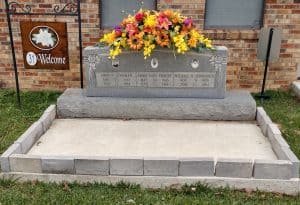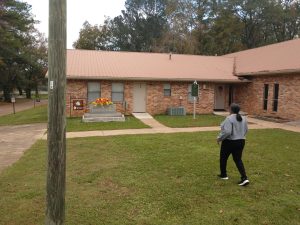Mount Nebo Missionary Baptist Church, located at 257 Carver Avenue in Philadelphia, Neshoba County, Mississippi, was a unique institution that not only served the needs of its parishioners but was also the headquarters for civil rights activity in that region of Mississippi in the 1960s. Founded in 1947 by the Reverend A.D. Adkins, it would eventually serve as a cornerstone of the civil rights movement. It played a pivotal role in shaping history through its central role in hosting meetings and programs.
Mount Nebo was the only church that openly allowed the Congress of Racial Equality (CORE) or any civil rights workers to maintain its mass meetings there for voter registration during the Freedom Summer 1964. That year, three civil rights workers, James Chaney, Michael Schwerner, and Andrew Goodman, who were part of the Mississippi Summer Project, worked for Black voter registration and desegregation of schools and public accommodations in the area. In June 1964, they traveled from Mount Nebo north to assist in investigating the bombing of Mount Zion Church in Philadelphia. The three went missing, and a Choctaw Indian eventually discovered their bodies in the Bogue Chitto Swamp. The Ku Klux Klan had brutally executed the three on a secluded dirt road in the county. Most local whites refused to cooperate with the subsequent federal investigation.
After the murders, numerous meetings continued at Mount Nebo, where efforts were now focused on strategies to protect civil rights workers and maintain peace in the area while still pushing forward on the civil rights agenda that had cost the lives of Chaney, Schwerner, and Goodman.

Memorial to Andrew Goodman, James Chaney, and Michael Schwerner at Mt Nebo Church, Philadephia, Mississippi (Courtesy of Douglas Bender)
Nebo Missionary’s pivotal role in the civil rights movement brought national and global attention to Mississippi and racial injustice across the United States. The meetings and programs at this small church contributed to the passage of the landmark Civil Rights Act of 1964, even before the deaths of the three civil rights workers. The Act, signed by U.S. President Lyndon Johnson, prohibited discrimination in public places, promoted the integration of public schools and other public facilities, and made employment discrimination illegal. It was the most significant civil rights legislation since Reconstruction.
In 1966, Dr. Martin Luther King, Jr. came to Philadelphia to memorialize the slain civil rights workers. He led a memorial service at Mount Nebo, knelt and prayed at a site outside the church, and led a march to honor the men.

Belinda Bender walking toward the memorial to the slain Civil Rights Workers at Mount Nebo, Nov. 2024 (Courtesy of Douglas Bender)
In 1976, Mount Nebo erected a monument donated by the Neshoba County Welfare Club and spearheaded by Lillie Jones, whose house was a lookout post for cars coming down the street during Jim Crow. The site situated next to the church was seen as a lasting tribute to honor the three slain civil rights volunteers who gave their lives for racial justice in Mississippi.
In 2024, Mount Nebo Missionary Baptist Church was the site of a unique historical dedication. This time, much of the entire community, Black and white, gathered to witness and recognize the unveiling of the Historical Marker by the State of Mississippi and the Mississippi Department of Archives and History, which was centered around the civil rights movement and the church’s leadership contribution.



















